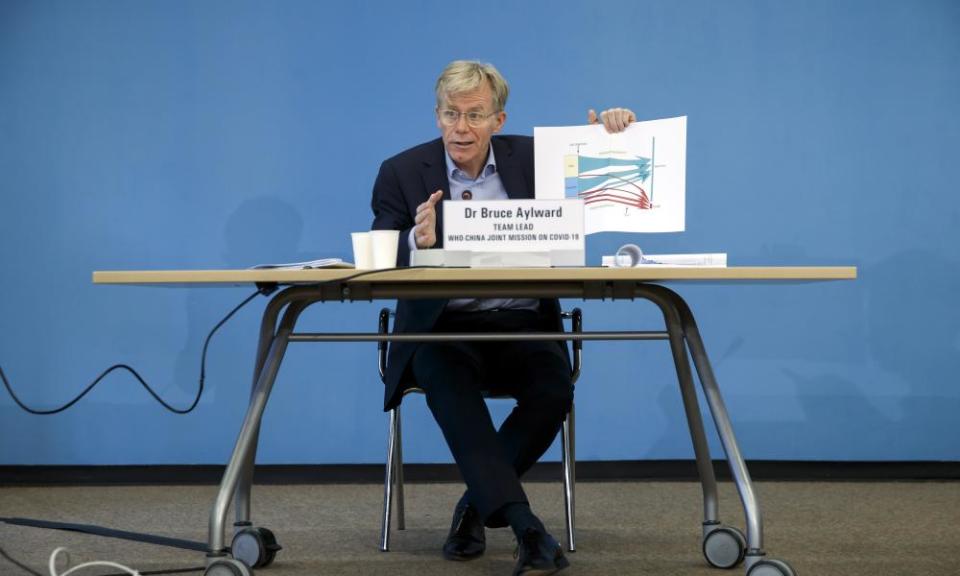Senior WHO adviser appears to dodge question on Taiwan's Covid-19 response

A senior advisor at the World Health Organization (WHO) appeared to hang up on a journalist who asked about Taiwan’s response to the coronavirus pandemic, and then did not answer further questions because they had “already talked about China”.
It comes amid continued criticism of the WHO’s approach towards both Taiwan and China. Taiwan has been excluded from participating in the World Health Assembly after heavy lobbying from China, which considers Taiwan part of its territory.
On Friday Hong Kong’s RTHK interviewed Dr Bruce Aylward, a Canadian physician and epidemiologist, and assistant director-general at the WHO.
The interview, conducted via video-link, was about international responses to the pandemic, and in particular Taiwan’s, where they have recorded a low rate of infection and low rate of fatalities.
Asked by the RTHK reporter, Yvonne Tong, if the WHO would reconsider Taiwan’s membership, Aylward didn’t respond for several seconds, before saying he couldn’t hear the question.
Tong offered to repeat it but he cut in: “no, that’s OK, let’ move to another one then.”
“I’m actually curious to talk about Taiwan as well,” Tong said.
Aylward then appeared to either hang up the call, or get disconnected. RTHK called Aylward back, and Tong asked if he could comment “on how Taiwan has done so far in terms of containing the virus”.
Aylward responded: “Well, we’ve already talked about China. And when you look across all the different areas of China, they’ve actually all done quite a good job.”
“With that I’d like to thank you very much for inviting us to participate,” he said, ending the conversation.
On Sunday the WHO said Aylward “did not answer a question on Taiwan’s response” but said it was working with Taiwanese health experts. It said questions of membership were up to member states, not WHO staff.
The WHO, and in particular its director general, Tedros Adhanom Ghebreyesus, have been accused of being too deferential to China and accepting of China’s claims about the virus outbreak despite evidence it initially covered it up.
In February, Aylward, who has decades of experience in battling disease outbreaks, led a WHO mission to Wuhan, several weeks after the pandemic started. After returning he told media the country had “absolutely turned it around”.
In a clip shared by Chinese media, Aylward said the country knew what it was doing and “if I had Covid-19 I’d want to be treated in China,” he said.
After the RTHK interview video went viral, Taiwan’s foreign minister Joseph Wu said the WHO should “set politics aside in dealing with a pandemic”.
“FYI @WHO, 450+ news reports from 40+ countries so far positively covered #Taiwan’s handling of #COVID19,” he said.
“These reports do not mistake us as part of China & #TaiwanCanHelp. JW.”
Wow, can’t even utter “Taiwan” in the WHO? You should set politics aside in dealing with a pandemic. FYI @WHO, 450+ news reports from 40+ countries so far positively covered #Taiwan’s handling of #COVID19. These reports do not mistake us as part of China & #TaiwanCanHelp. JW https://t.co/KbupbUb7NG
— 外交部 Ministry of Foreign Affairs, ROC (Taiwan) 🇹🇼 (@MOFA_Taiwan) March 29, 2020
An account controlled by the Taiwan presidential spokesman said the clip “looks like the WHO has a poor connection with more than just reality”.
The Taiwanese government said it has been cut out of discussions despite its success, and claims that it warned the WHO about the risk of human-to-human transmission of a the virus in December, but was ignored.
The WHO did not declare a pandemic until March, when the virus had already reached more than 110 countries and infected more than 100,000 people.
Aylward defended the WHO’s response over recent months an his interview with the Pulse, saying it always knew there was the potential it would become a pandemic, but society had the potential to prevent it “if we do the kind of measures that China put in place”.
He said any country which failed to do so had to “take a look at itself.”
On Monday, the WHO website no longer appeared to list Aylward as an assistant director-general.
A cached copy of the website, captured on Friday, contained a page with the job title and biography of Aylward. That link now directs to a list of the WHO’s leadership team, but Aylward is not listed.
The WHO has been contacted for comment.

 Yahoo News
Yahoo News 